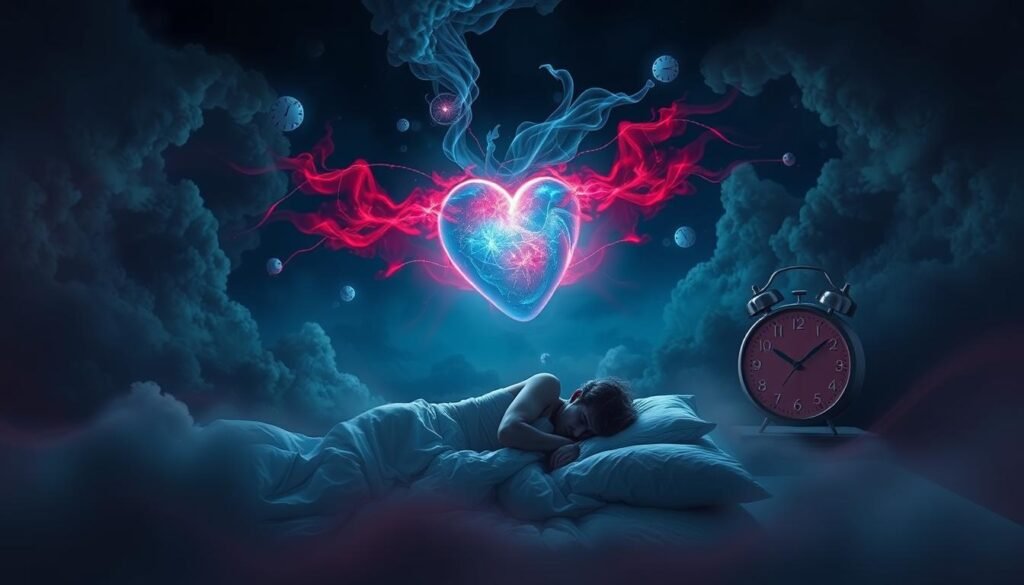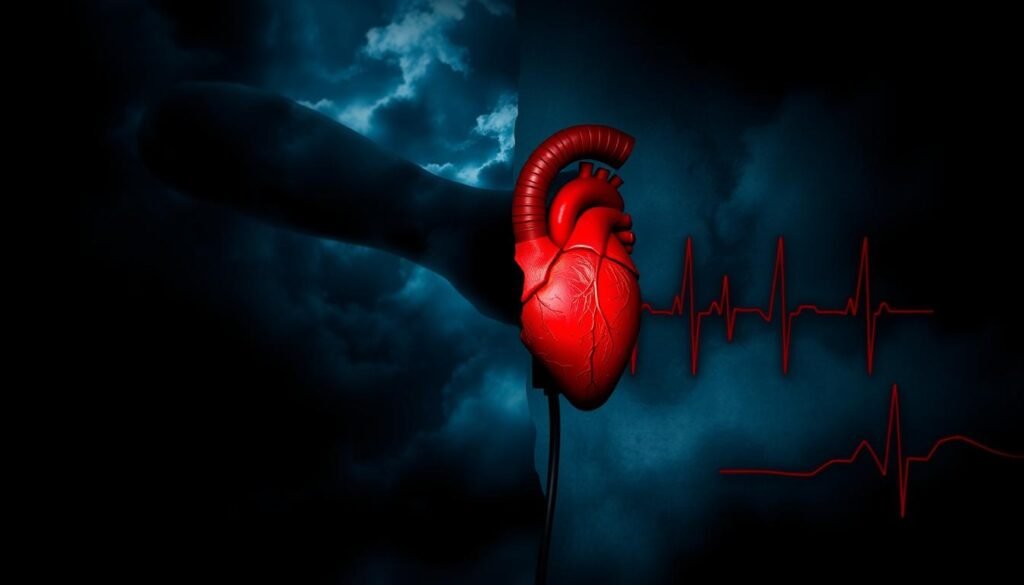Have you ever wondered how your sleepless nights could be raising your blood pressure? Insomnia’s impact on hypertension is quite significant. A lot of adults in the United States are affected by it. This situation creates a complex link with high blood pressure. Nearly half of Americans struggle with hypertension. This condition is defined by systolic blood pressure over 130 mm Hg and diastolic levels above 80 mm Hg.
One in three adults can’t get the 7 hours of sleep recommended each night. This fact raises questions about the connection between sleep problems and high blood pressure. This article looks at how insomnia plays a role in increasing blood pressure. It also explores the two-way relationship between sleepless nights and higher hypertension risks.
Key Takeaways
- Insomnia significantly increases the risk of developing hypertension.
- Nearly half of all U.S. adults experience hypertension.
- 1 in 3 Americans consistently get less than the recommended sleep.
- Short sleep duration is linked to rising blood pressure levels and cardiovascular risks.
- Chronic insomnia can lead to increased sympathetic nerve activity and inflammation.
- Women with sleep disturbances are at a higher risk of developing hypertension.
Understanding Insomnia
Insomnia makes it hard to start or keep sleeping. It shows itself in ways like not being able to fall asleep, waking up too early, and sleep that doesn’t refresh you. According to the definition of insomnia, struggling to sleep well not only affects well-being. It also hikes the risk of heart diseases, such as high blood pressure.
Definition and Symptoms of Insomnia
The definition of insomnia covers sleep issues that are either ongoing or brief. Symptoms you might notice include:
- Difficulty falling asleep
- Waking frequently during the night
- Struggling to return to sleep after waking
- Waking too early in the morning
- Feeling tired upon waking
Many people face this problem, leading to more stress and anxiety. Studies show that 7 to 15% of adults in the U.S. deal with chronic insomnia. This shows how common insomnia is and why it’s a big health issue.
Prevalence of Insomnia in the United States
Insomnia is a big problem in the U.S. Studies say 17% to 19% of adults have it. It messes with sleep and raises the chance of heart disease. This is crucial for understanding heart health and its link to high blood pressure. A study discovered people with insomnia have a 45% higher chance of getting heart disease. This underscores how vital it is to pay attention to and treat this sleep problem well.
To learn more about how insomnia and high blood pressure are connected, look at this study on the relationship between them. It’s important to understand these links to find better ways to lessen health risks linked to insomnia.
Overview of Hypertension
Hypertension, or high blood pressure, is a major health concern for many. It’s vital to understand the causes of hypertension and related risk factors to manage and prevent it effectively. Many factors can lead to high blood pressure, and unfortunately, many people don’t know they have it.
Causes and Risk Factors of Hypertension
The risk factors of hypertension are divided into ones you can control and ones you can’t. Controllable factors involve lifestyle choices such as:
- Obesity
- Lack of physical activity
- High salt and alcohol intake
- Smoking
On the other side, genetics and aging are factors beyond our control. Stress and anxiety, too, can make hypertension worse. Sleep disorders, especially insomnia and obstructive sleep apnea, have been linked to hypertension. This shows how crucial good sleep is for healthy blood pressure.
Statistics on Hypertension in the U.S.
About 75 million Americans have high blood pressure. This figure represents almost one out of every three adults. Worldwide, an estimated 1.28 billion people aged 30 to 79 have hypertension. Shockingly, 700 million of them are not getting the treatment they need.
There’s a clear link between sleep problems and rising hypertension rates. It’s estimated that over 70 million Americans lack proper sleep. Addressing sleep issues can include better sleep habits and staying active.
| Statistic | Value |
|---|---|
| Americans with High Blood Pressure | 75 million |
| Globally Affected Population | 1.28 billion |
| Sleep-Deprived Americans | Over 70 million |
| Individuals Not Treated for Hypertension | More than 700 million |
The Connection Between Sleep and Health
Understanding how sleep and health are linked is key to staying healthy. Sleep is vital for many body functions, like hormonal control. If you don’t sleep well, it can mess up stress and metabolism hormones. This might increase your chance of getting high blood pressure.
Impact of Sleep on Hormonal Regulation
Sleep is crucial for controlling stress and metabolism hormones. Not sleeping enough can boost stress hormones, raising blood pressure. Studies show that sleep quality is closely related to hormone balance. This affects heart health and more.
Effect of Sleep Quality on Overall Health
Poor sleep affects your health in many ways. Research indicates that not sleeping enough is linked to more cases of high blood pressure. Sleeping less than five hours a night could make you 60% more likely to develop high blood pressure. Good sleep is crucial for heart health and avoiding health issues.
| Fact | Impact on Health |
|---|---|
| Short sleep duration (≤5 h/night) | Increased risk of hypertension by 60% |
| Nocturnal BP vs Daytime BP | Nocturnal BP is a superior predictor of cardiovascular risk |
| Difficulty falling asleep | Associated with a slightly higher risk of hypertension (OR 1.2) |
| Women with low sleep duration | 10% more likely to develop hypertension |
Recognizing how crucial good sleep quality and enough sleep are can help prevent high blood pressure and heart diseases.
Insomnia’s Role in High Blood Pressure
Recent studies have focused on how insomnia affects high blood pressure. They show a detailed connection worthy of more study. People with insomnia have a higher risk of getting high blood pressure than those who sleep well.
Research Findings on Insomnia and Blood Pressure
A big review of 23 studies found those with insomnia had a 20% higher chance of high blood pressure. Early waking and other symptoms strongly link insomnia to high blood pressure. Over 16 years, research tracking 66,000 women found poor sleep ups the risk of high blood pressure.
The American Journal of Hypertension also found that insomnia symptoms and high blood pressure are connected. To dive deeper, check out this research article.
Mechanisms Linking Insomnia to Hypertension
Insomnia may lead to high blood pressure through several ways. Sleep issues during menopause can make this worse, possibly leading to hypertension. Lack of sleep also causes stress responses to go up, which raises blood pressure.
About half of Americans have high blood pressure, often without knowing the risks. Insomnia and high blood pressure together create a harmful cycle. It’s crucial to address this early.

The Bidirectional Relationship Between Insomnia and Hypertension
The connection between insomnia and hypertension is complex and goes both ways. People with high blood pressure often struggle to sleep well. This problem can cause serious sleep disorders. It shows why it’s critical to see how these conditions can make each other worse, making life hard for sufferers.
How Hypertension Contributes to Sleep Disorders
Hypertension can wreck the quality of your sleep. High blood pressure might lead to conditions like sleep apnea, disturbing restful sleep. Research shows that between 30% to 40% of adults have insomnia symptoms. This reveals the bidirectional relationship between insomnia and hypertension, where each issue can make the other more severe.
Potential Cycles of Sleep Deprivation and High Blood Pressure
Lack of sleep can start a harmful cycle that makes hypertension worse. Not sleeping enough can make stress hormones, such as cortisol, go up. This can increase blood pressure. On the other hand, ongoing high blood pressure can cause insomnia. This results in more cycles of sleep deprivation. As one condition gets worse, so does the other, creating a hard-to-break cycle.
| Condition | Effect on Sleep | Effect on Blood Pressure |
|---|---|---|
| Insomnia | Causes difficulties in falling or staying asleep | Can lead to increased blood pressure levels |
| Hypertension | Creates risk of sleep apnea and other disorders | Elevated stress hormones contribute to worsening blood pressure |
| Overall Cycle | Persistence of sleep issues | Exacerbation of hypertension symptoms |
Understanding this link sheds light on treatment options. It shows the need to tackle both problems together to break the cycle. A holistic treatment plan can make a big difference in the lives of those affected, improving their health and well-being.
Insomnia Impact on Cardiovascular Health
Insomnia significantly impacts heart health. People with sleep problems don’t just feel tired. They have a higher chance of heart disease and poor health. Around 30% of people suffer from chronic insomnia. This condition is linked to heart issues.
Role of Sleep Disorders in Heart Disease
Studies show insomnia effects on cardiovascular health are serious. People with sleep disorders are more likely to get heart disease. They have a 48% higher risk of heart attack and a 53% higher risk of dying from heart problems. Insomnia leads to changes in the body that cause high blood pressure and heart failure.
Long-term Effects of Chronic Insomnia on Heart Health
The long-term effects of insomnia are worrying. People with ongoing sleep problems are 1.3 times more likely to get heart disease. They also have a 31% higher risk of dying from any cause. Younger people with insomnia, under 50, are nearly four times as likely to have a stroke than those without sleep problems.
| Risk Factor | Increased Risk for Insomnia Patients |
|---|---|
| Myocardial Infarction | 48% |
| Cardiovascular Mortality | 53% |
| Incidence of Cardiovascular Illness | 14% |
| All-cause Deaths | 31% |
| Stroke Risk (under 50) | Almost 4 times |
Sleep Disorders and Hypertension Connection
The link between sleep problems and high blood pressure is important to understand. Various sleep issues can make high blood pressure worse. This leads to worse health over time. Knowing how they’re connected helps us manage both better.
Common Sleep Disorders Associated with Hypertension
A few sleep disorders are closely tied to high blood pressure. Sleep apnea is one such disorder. It causes your blood pressure to go up. This happens because your breathing stops and starts during sleep. This leads to bad sleep and feeling tired during the day. Poor sleep makes your body release stress hormones, which increases blood pressure even more.
Restless leg syndrome and chronic insomnia can also hurt your blood pressure. Chronic insomnia, in particular, makes you more likely to get high blood pressure. Studies in well-known journals have shown this. Such sleep issues mess with how your body works. They can cause long-term health problems.
Hypertension can also make your sleep worse, creating a bad cycle. Poor sleep raises your blood pressure, and high blood pressure makes sleep worse. Managing sleep issues well, with lifestyle changes or medical help, is key to breaking this cycle.
Sleep Deprivation and Hypertension Correlation
Knowing how sleep deprivation and hypertension are connected is key. Not getting enough sleep really affects blood pressure. Many studies show that how long and well you sleep is crucial for heart health.
Understanding Sleep Duration and Quality
Adults need 7 to 9 hours of sleep each night. Yet, a lot of people aren’t sleeping enough. This leads to sleep deprivation.
Around 17% to 19% of people in the U.S. have insomnia. This issue impacts how long and well they sleep. Not sleeping enough can cause more than just tiredness. Studies found that sleeping less than six hours increases hypertension risk.
How Chronic Sleep Deprivation Affects Blood Pressure
Long-term lack of sleep causes changes in the body, raising blood pressure. People not getting enough sleep may see their blood pressure go up. This is due to bad glucose metabolism and more inflammation.
Research shows sleep loss raises systolic blood pressure. It also makes it harder for the body to manage stress hormones. This makes hypertension worse. Those sleeping under five hours a night have a much higher risk of high blood pressure.

Strategies for Managing Insomnia
Dealing with insomnia involves several steps. It’s about knowing why it happens and finding ways to sleep better. Boosting sleep hygiene is very important.
Improving Sleep Hygiene
Good sleep hygiene is key for better sleep. Here’s what you can do:
- Stick to a regular sleep schedule, sleeping and waking at the same time every day.
- Make your bedroom quiet and dark to help you rest.
- Stay away from caffeine and nicotine before bedtime.
- Cut down on screen time to avoid blue light before sleep.
- Try deep breathing or meditation to relax before going to bed.
These practices can really help you sleep better.
Therapies and Treatments for Insomnia
Different treatments can help with insomnia. Cognitive Behavioral Therapy for Insomnia (CBT-I) is one effective method. It helps most patients after 6 to 8 sessions, focusing on changing sleep habits.
Sometimes, other health issues or medications cause insomnia. It’s important to find out why to treat it right. If you need more help, seek out a therapist who knows about sleep problems.
For more details on understanding sleep disorders, check this resource. By using these strategies, you can not only sleep better but also improve your overall health.
Preventive Measures for Hypertension
It’s vital to take steps early to prevent high blood pressure. Making changes in your lifestyle can greatly improve your heart health. There are many ways to lower your risk of high blood pressure.
Lifestyle Changes to Lower Blood Pressure
Choosing the right lifestyle changes is crucial for blood pressure control. Consider these important changes:
- Balanced Diet: Eat whole grains, fruits, veggies, and low-fat dairy. This can drop your blood pressure by up to 11 mm Hg.
- Sodium Intake: Keeping sodium under 1,500 mg daily might cut blood pressure by 5 to 6 mm Hg.
- Regular Exercise: Aerobic activities like walking or biking can reduce high blood pressure by about 5 to 8 mm Hg.
- Moderate Alcohol Consumption: Drinking less can help too. For women, less than one drink a day; for men, two drinks may lower blood pressure by 4 mm Hg.
- Stress Management: Try reducing stress to help control blood pressure. More research is needed in this area, though.
- Healthy Weight: Keep an eye on your waistline. Men and women have different risk sizes.
- Sufficient Sleep: Getting 7 to 9 hours of good sleep each night is important for avoiding high blood pressure.
Importance of Regular Health Check-ups
Regular health check-ups are key to keeping an eye on blood pressure. Home monitors are helpful for daily checks. Catching high blood pressure early can help avoid serious problems like heart disease. Support groups can also offer valuable help.

| Preventive Measure | Potential BP Reduction (mm Hg) |
|---|---|
| Balanced Diet | Up to 11 |
| Limit Sodium | 5 to 6 |
| Aerobic Exercise | 5 to 8 |
| Moderate Alcohol | 4 |
| Stress Management | Varies |
| Healthy Weight | Varies |
| Sufficient Sleep | Potentially blocks risk |
Conclusion
The link between not sleeping well and high blood pressure is very important. Studies show that troubles like not sleeping enough can lead to high blood pressure. It’s especially worrying because not sleeping enough increases the risk of getting high blood pressure by 21%.
This problem also affects how our heart and blood vessels work because of sleep problems. Women are more likely to face these issues. Even small sleep problems can cause high blood pressure and inflammation. Right now, about one-third of people in the U.S. aren’t sleeping enough. It’s crucial to make more people aware of how these health issues are connected.
To deal with the rising concerns about sleep problems and high blood pressure, we should check for sleep troubles regularly. This could help prevent heart disease. In short, tackling sleep problems is key to improving heart health. We need to focus more on teaching people about this important connection.